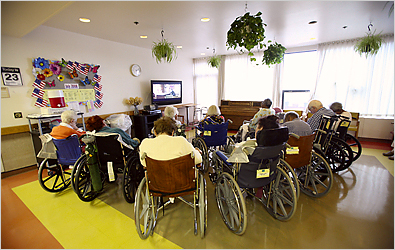What Happens To Nursing Home Residents If Ryan Plan Becomes Law

As the country readies for the 2012 Presidential election, stark differences emerge between the parties on some of the most basic programs affecting Americans. One of these is Medicaid.
Although most of us are not affected by Medicaid, the medical program designed primarily for the poor, one striking exception for middle America is Medicaid since it is used to pay for long term care, mostly in nursing homes. When parents and spouses reach the point that they have exhausted their assets, often after months or years of paying for their care, Medicaid has been the safety net that allows them to remain in nursing homes and, in some cases, under the Medicaid waiver program, in their own homes. This is when middle Americans who have spent their entire working lives contributing by working and paying taxes, hope and have expected that Medicaid will pay for their care.
Under the plan proposed by Paul Ryan, the Republican Vice Presidential candidate and endorsed by Republicans and passed through the House of Representatives as the 2012-2013 “Path to Prosperity: A Blueprint for American Renewal,” otherwise referred to as the Ryan Budget or Ryan Plan, and also contained in the Republican Party Platform for President, Medicaid, unlike Medicare, would be immediately affected. Medicaid under Republicans could, as soon as 2013, be converted from a joint federal-state plan with predictable coverage to a block grant program without the protections currently available to beneficiaries. With block grants, the government would give a specified amount of money to the State and the State could, unless other legal restrictions apply, spend it without regard for federal guidelines or protections now in place for individuals and families. Anyone who has a relative – a parent, spouse or in-law in a nursing home or on Medicaid should stand up and take note because the changes could come and they could come soon.
Here, as described by the Center for Medicare Advocacy, a national nonprofit, nonpartisan organization that educates the public on senior health issues, are some of the differences. For more details see www.medicareadvocacy.org/medicaid-long-term-care-and-the-ryan-plan/.
“…Nursing Home Residents Could Lose Medicaid Coverage of Their Nursing Home Care. Nearly a million and a half people live in nursing facilities. In June 2012, more than one million of them relied on Medicare or Medicaid to pay for their care in whole or in part…<W>hile the Medicare program pays for many residents at the beginning of their stay, Medicare actually provides a relatively short benefit for nursing home care. On average, in 2009, Medicare paid for only 27.3 days of care in abenefit period and in 2010, 27.1. Most residents remain in a nursing home fare longer than a month… Medicaid quickly becomes the primary payer for long-term care…The Ryan Budget and the Republican Platform would unwind Medicaid, leaving nearly a million people without a secure source of funding for their care…”
The article notes that Medicaid beneficiaries already contribute, in most cases, all of their monthly income toward their support while in a nursing home and under “estate recovery” the government can proceed against assets that might remain in their name after their death. It reports average cost of care in a semi-private room in the U.S. as $75,555 per month. In Chester County figures are considerably higher.
The Center for Medicare Advocacy article continues:
“Even if States Choose to Pay for Nursing Home Care under a Block Grant Program, Medicaid’s Current Financial Rules and Protections for Residents and Their Families Could Disappear. Although it is unlikely that states would stop providing at least some coverage for nursing home care, the specific services that would be covered, how much the state would pay for them, and how much residents and their families would be required to pay, would be likely to change drastically from current practice.
Under a Medicaid block grant program, states could reduce the types of services, or the duration of services that they cover under a Medicaid nursing home benefit. Many people who are currently entitled to comprehensive nursing home care could see their nursing home services reduced in scope or duration, or both…” id.
In short, States could not cover nursing home care or could cover only those residents currently in nursing homes or could discontinue coverage after a period of time and require families to pay. This is especially true in Pennsylvania with “filial responsibility.” They could refuse to cover in-home waiver services or could require spouses to exhaust all of their resources before their spouse in a nursing home could be covered. The consequences are serious and cannot be ignored.
For more, listen to “50+ Planning Ahead” a weekly radio program on WCHE 1520 on every Wednesday from 4:30 pm to 5:00 pm with Janet Colliton, Colliton Law Assocs., PC, and Phil McFadden of Home Instead Senior Care.
About the Author Janet Colliton
Esquire, Colliton Law Associates, P.C. Janet Colliton has practiced law for over 38 years, 37 of them in Chester County, Pennsylvania, a suburb of Philadelphia. Her practice, Colliton Law Associates, PC, is limited to elder law, Medicaid, including advice, applications and appeals, and other benefits planning including Veterans benefits, life care and special needs planning, guardianships, retirement, and estate planning and administration.
